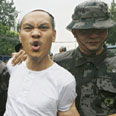
Philippines arrests terrorist who planned attack on Israel embassy
Police chief says Dinno-Amor Pareja, leader of group with links to Qaeda-affiliated Abu Sayyaf, plan attacks on US, British and Israel embassies in Manila; the attacks were foiled after 600 kg of explosives were seized
The Philippines said on Tuesday it had eradicated a group of Muslim militants with links to the notorious Abu Sayyaf rebels after the arrest of its top leader suspected to be part of a 2006 plot to bomb Western embassies.
"We believe that his group is already obliterated," national police chief Jesus Verzosa said, referring to Rajah Solaiman Movement (RSM), a small group known for bomb attacks in the capital and in the southern island of Mindanao.
RSM, with less than 50 members, has close links with the al Qaeda-affiliated Abu Sayyaf, the deadliest Muslim rebel group in the Philippines.
Dinno-Amor Pareja, 28, also known as Khalil and Abu Jihad, did not resist arrest when law enforcement teams stormed his hideout in Marawi City on Mindanao last Friday, Verzosa told reporters.

Faces rebellion and murder charges. Pareja (Photo: AP)
Pareja, who is also on the wanted list of the US treasury department, assumed the leadership of the RSM group in 2005 when its two top leaders and organizers were arrested.
Verzosa said Pareja helped plan attacks on the embassies of the United Kingdom, United States and Israel in Manila and during the meetings of the Association of South East Asian Nations (ASEAN) in Cebu City in the central Philippines in 2006.
Security forces foiled the plots after 600 kg of explosives were seized in a raid in a Manila suburb. But they failed to arrest Pareja who sought refuge in Muslim rebel bases in Mindanao.
Police escorted a handcuffed Pareja to a detention facility in a police camp in the capital on Tuesday, hours after he was flown in from the southern Philippines.
Pareja is also facing rebellion and murder charges for a February 2005 commuter bus bombing that killed three people and wounded dozens in Manila's main business district.
Last year, Pareja was among seven RSM leaders tagged as terrorists by the US Treasury Department and was added to the United Nations' terrorism list of people and entities associated with Osama bin Laden and al Qaeda.










